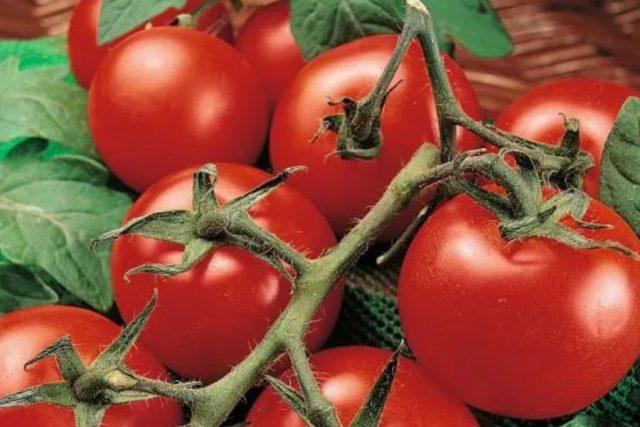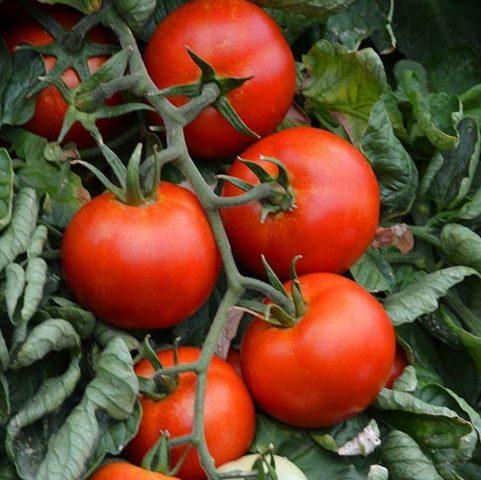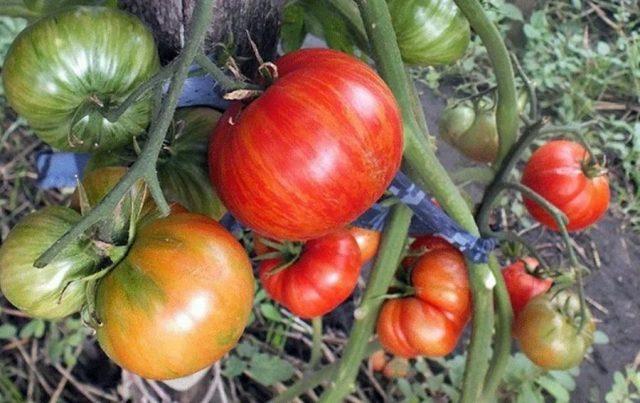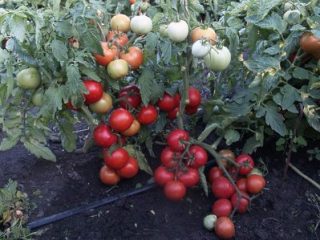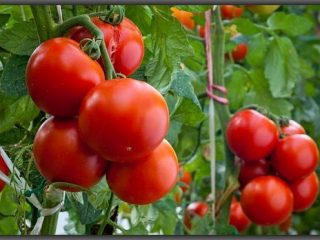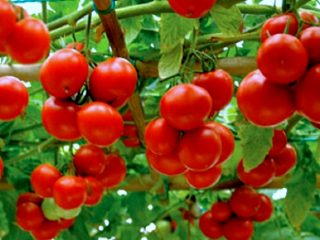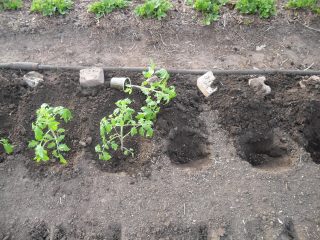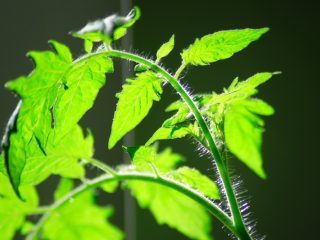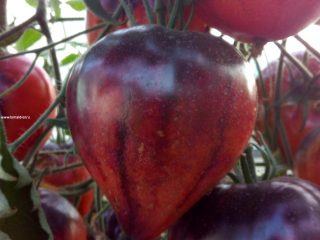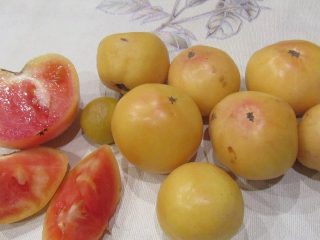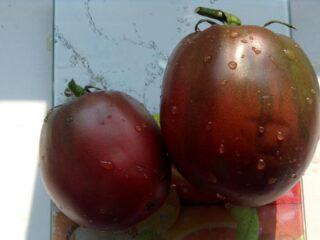Content
Mosaic on tomatoes is difficult to treat. However, some methods can minimize the damage caused by the disease to plantings.
Causes
Tomato mosaic is a viral disease that is most often provoked by the pathogen Tobacco mosaic tobamovirus. The disease is resistant to external influences and harms vegetables both in open ground and in greenhouse conditions.
Most often, mosaic on tomatoes appears for the following reasons:
- presence of infection on seeds or in soil;
- using dirty garden tools when caring for tomato bushes;
- entry of the virus into tissues through damage to leaves and roots;
- the presence of contaminated plant residues in the beds.
The pathogen can first get on the gardener’s clothes and shoes, and then move on to the tomato bushes.The virus is spread by some insects - thrips, cicadas and aphids.
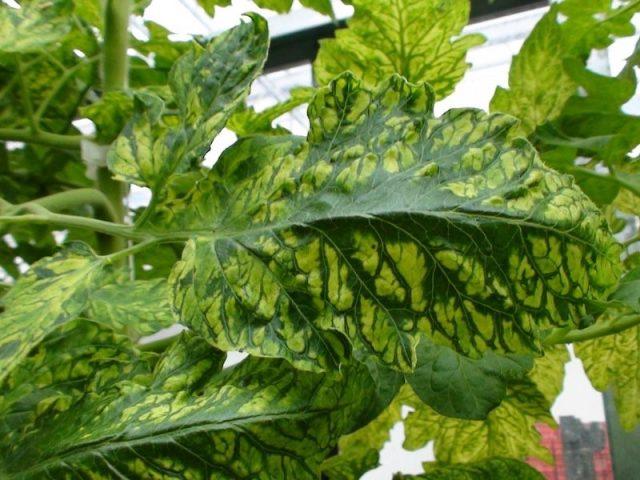
Tobacco mosaic affects not only tomatoes, but also peppers, eggplants, potatoes and other crops
Symptoms of infection
Mosaic spotting of tomatoes manifests itself with characteristic signs. The following symptoms may suggest the disease:
- wilting of leaves and loss of elasticity of the plates;
- change in color - green bushes become light green, bright yellow or light straw;
- folding - with tobacco mosaic, tomato leaves grow unevenly, the symptom is especially pronounced in the upper part of the bushes;
- deformation - the plates greatly decrease in size and narrow, sometimes acquiring a thread-like shape.
As the disease develops at the fruiting stage, gray-green areas appear on the tops of the tomatoes. Subsequently, the tissues die, the tomatoes become covered with a thin brown mesh.
Varieties
Photos of the viral mosaic of tomatoes and treatment show that the disease is represented by two main varieties. The types of the disease differ in external manifestations and degree of danger.
Pepino mosaic virus on tomatoes
Pepino mosaic is considered the most dangerous. It quickly affects tomato bushes, leading to changes in leaf color and chlorosis. The tops of the shoots become thinner and become nettle-shaped. Not only mosaic lightened areas, but also bubbly swellings may appear on the plates.
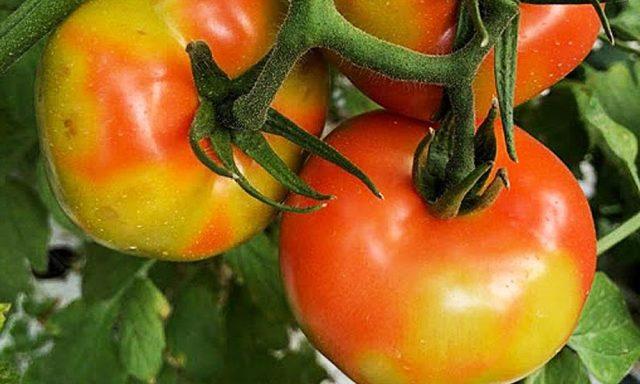
Pepino mosaic especially often damages fruits, changes their color and impairs their taste.
Tobacco mosaic virus on tomatoes
Tobacco mosaic is a very common disease throughout the world.It appears as yellow and light spots on the leaves and causes curvature of the above-ground parts of tomato bushes. If left untreated, it leads to tissue necrosis. Tomato fruits affected by a viral disease decrease in size, become deformed and darken.
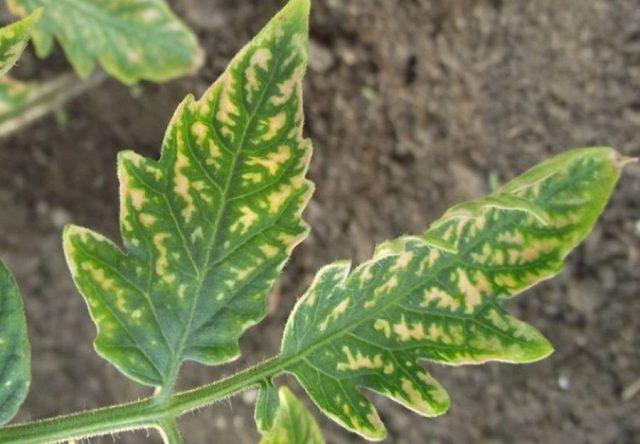
Tobacco mosaic increases the vulnerability of tomatoes to other infections
Why is tomato mosaic disease dangerous?
Spotted mosaic on tomatoes causes severe damage to plantings. In the absence of treatment:
- the tops of tomato bushes become thinner and begin to curl;
- leaves become yellow-green or fade greatly;
- spots and necrotic areas appear on the stems and petioles;
- the fruits become smaller, ripen unevenly and fall off prematurely;
- yellow and brown spots form on tomatoes growing closer to the base of the stem;
- tomatoes darken from the inside, a kind of brown mesh appears in the pulp.
Viral tobacco mosaic spreads very quickly throughout plantings and spreads from diseased bushes to healthy ones. Productivity drops sharply, even fruits that are still suitable for consumption lose their marketable appearance.
How to deal with mosaic on tomatoes
Photos of mosaics on tomatoes and treatment demonstrate that both traditional methods and chemicals are used to combat the disease. It should be noted that they show the greatest effectiveness in the first stages of the development of the disease.
Chemicals
If spots on the leaves of a tomato are very noticeable, like a mosaic, the affected plants must first of all be completely removed from the garden bed. The remaining bushes are treated with chemicals to protect them from the development of the disease.
Fufanon Nova
The drug Fufanon, which is based on the active substance malathion, belongs to the category of insecticides. Designed primarily to combat tobacco mosaic spreaders - aphids, whiteflies, thrips, weevils and other insects.
To treat tomatoes, you need to dilute about 5 ml of the concentrated preparation in 5 liters of water. The resulting product is poured into a spray bottle and used to spray the plantings on the leaves. At 10 m2 The garden should use about 2 liters of the drug.
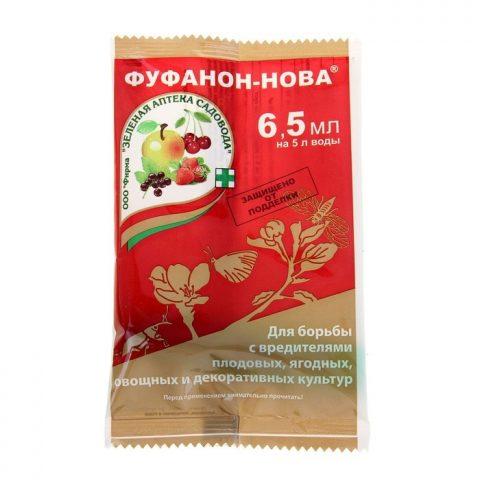
Fufanon Nova protects tomatoes from pests and tobacco mosaic for 2-4 weeks
Karbofos
Another malathion-based chemical is designed to combat parasites, bacteria and viral pathogens. Disintegrates quickly in the soil and does not harm beneficial microflora.
To treat tomatoes affected by tobacco mosaic, it is necessary to dilute 75 g of the substance in a small amount of water. The liquid is brought to a homogeneous state, and then added to the volume of a full bucket. The resulting preparation is used for spraying the stems and leaves of tomatoes in cloudy but dry weather.
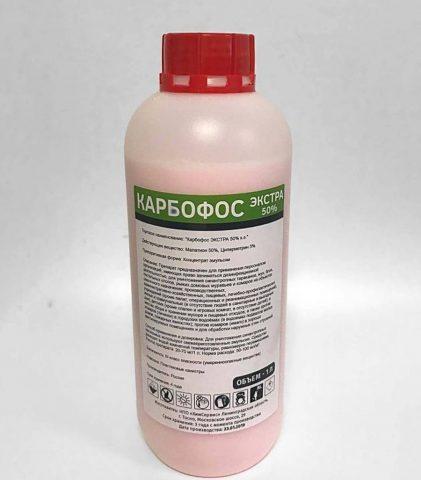
The protective effect of Karbofos lasts about ten days, so it is recommended to repeat the treatment for tobacco mosaic 2-3 times
Biological products
Biological drugs have a good effect in the early stages of tobacco mosaic development. They are safer for vegetables than chemicals and do not harm ripening fruits. The use of the compositions is allowed even shortly before harvest.
Novosil
The immunostimulating agent increases the endurance of tomatoes and strengthens their root system. With regular treatments, tomato bushes are less likely to suffer from fungi. The drug is also able to fight the tobacco mosaic virus in the early stages.
To spray Novosil, use this method - dilute about 15 drops of the product in 3 liters of water. The crop is treated with a homogeneous composition on the leaves. It is advisable to spray three times a season with short intervals - during the flowering period, and then during the formation of fruits.
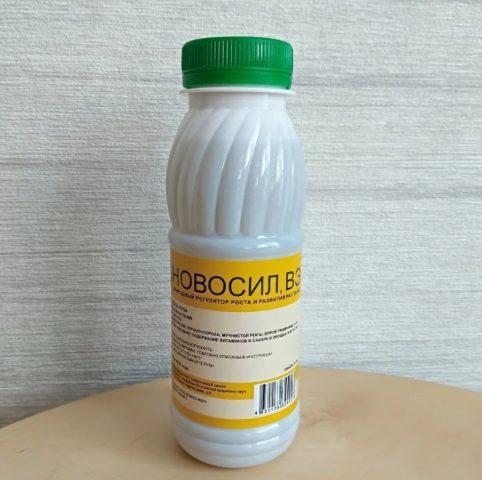
Tomatoes should be sprayed with Novosil in windless, dry weather.
Immunocytophyte
The biostimulating drug contains urea and arachidonic acid. The product protects tomatoes from infection by tobacco mosaic, prevents the development of fungi and accelerates the growth of bushes.
To spray tomatoes, you need to dilute one Immunocytophyte tablet in a glass of water, stir and add up to 2 liters. The solution is used for treating leaves in warm and cloudy weather. It is also useful to soak tomato seeds in the preparation before planting. In this case, use a concentrated product - dilute the tablet in 15 ml of water and immerse about 5 g of culture grains in the resulting liquid.
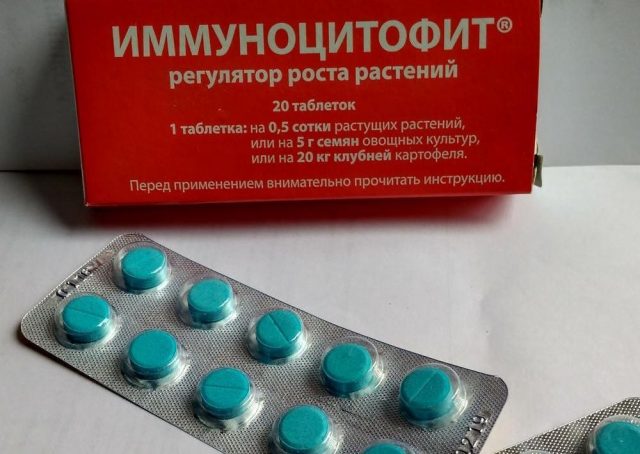
Immunocytophyte for tomatoes is used three times per season - at the seedling stage, during the flowering period and during fruit set.
Folk remedies for tomato mosaic
You can treat tobacco mosaic of tomatoes in the initial stages with folk remedies. It should be borne in mind that their efficiency is average.If the symptoms of a viral disease are pronounced, treatments with home remedies may not bring results.
Boric acid
The cheap product protects tomatoes well from viruses and fungi, and also serves as a useful supplement. To spray the bushes, you need to dilute 1 ml of the drug in 1 liter of water and mix thoroughly.
The solution is used to treat plants in the evening or morning. Spraying is repeated twice a week until the condition of the plantings improves.
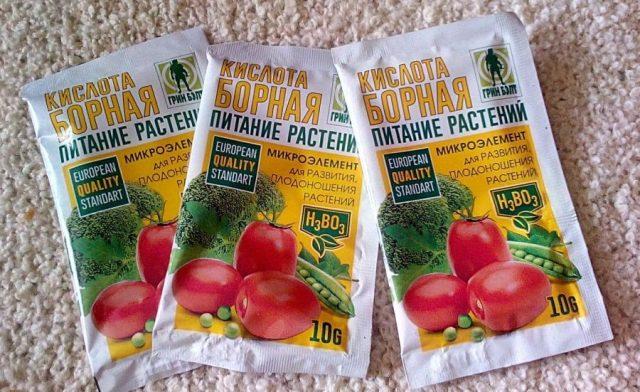
Boric acid improves the metabolic processes of tomatoes and also protects the bushes from pests - in particular, from aphids and ants
Iodine solution
A solution prepared based on milk and iodine has good antiviral properties. The home remedy replenishes the deficiency of iron and potassium, which are necessary for the development of the crop, accelerates the growth of shoots and increases the resistance of bushes to diseases.
To prepare a therapeutic and prophylactic drug, mix 1 liter of milk in a bucket of water, and then add ten drops of iodine tincture. A homogeneous product is used to irrigate bushes at the first symptoms of tobacco mosaic, and then spraying is repeated a week later.
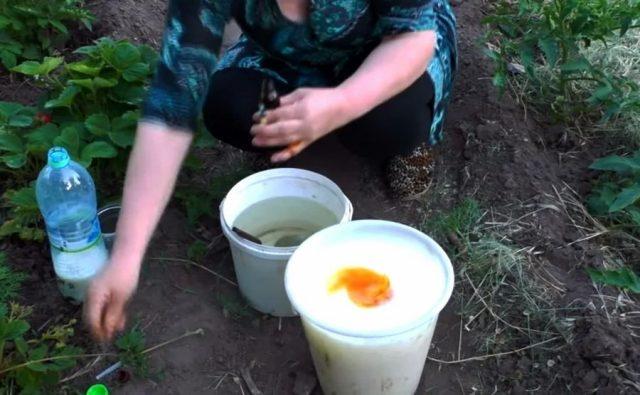
To prepare a milk-iodine solution, you need to use natural milk with a low fat content
How to deal with mosaic on tomatoes in a greenhouse
A white mosaic on tomato leaves appears both on bushes in open ground and in greenhouses. Treatment is generally carried out using the same methods. Severely damaged plants in the greenhouse are removed from the beds, and the remaining bushes are sprayed with folk remedies or chemicals.
The peculiarity of treating tomatoes in a greenhouse with tobacco mosaic is that it is also necessary to treat the walls of the structure.Viral particles can remain on them, which will subsequently lead to a relapse of the disease. Also, during the treatment process, it is recommended to spill the selected drug into the soil in order to reliably eliminate the causative agent of the disease in the soil.
How to deal with mosaic on tomato seedlings
Tobacco mosaic can appear on tomatoes at the very first stages of development - this happens if the planting material is already infected with the virus. When white and yellow spots form on the leaves of seedlings, it is necessary to urgently destroy all affected seedlings. The virus very quickly affects seedlings located close to each other.
Tomato mosaic treatment at the seedling stage is carried out with the same preparations that are used to treat adult plants. But the dosages are reduced to a minimum. In addition to chemicals and biological agents, it is also allowed to use solutions of potassium permanganate, hydrogen peroxide or chlorhexidine.
To reduce the risk of developing tobacco mosaic, it is recommended to treat tomato seeds before planting. The grains are briefly placed in a solution of Fitosporin or potassium permanganate to disinfect and increase immunity.
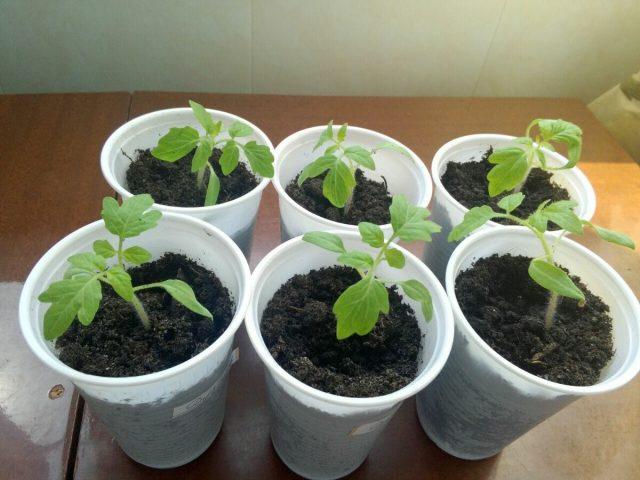
To prevent tobacco mosaic, tomato seeds should be sown not in a common box, but immediately in separate cups
Prevention measures
Since tobacco mosaic is difficult to treat, the main focus should be on prevention. In particular, it is recommended:
- use tomato seeds from trusted suppliers for sowing;
- do not neglect pre-planting treatment;
- observe crop rotation when growing tomatoes;
- Disinfect garden tools after each use;
- Regularly weed beds with tomatoes to remove weeds;
- prevent the spread of pests on the site;
- pay attention to regular feeding.
When growing tomatoes in a greenhouse, the top layer of soil about 15 cm thick must be replaced annually. After harvesting, the walls of the greenhouse are disinfected from fungi, viruses and microorganisms every autumn.
Tomatoes resistant to disease
Some tomato varieties demonstrate good resistance to viral diseases. Rarely suffer from tobacco mosaic:
- Ural. The large-fruited variety produces tomatoes up to 200-350 g in weight, flat-round in shape. The tomato has a good taste and is often grown for sale.
Hybrid tomato Ural gives up to 9 kg of yield per 1 m2
- Charisma. The variety is intended for cultivation in greenhouse conditions and has good resistance to fungi and viruses. It bears fruit 115 days after germination and demonstrates good keeping quality.
Charisma tomatoes reach 150 g in weight
- Firebird. The popular hybrid ripens in 100 days and develops in a greenhouse and in open ground. It produces large red-orange tomatoes, up to 150 g each, and is characterized by high immunity to viruses and cold resistance.
Tomato Firebird allows you to collect up to 13.5 kg of fruit from 1 m2 of plantings
Varieties with high immunity suffer from tobacco mosaic less often than others, but they are not completely protected from the virus. When growing tomatoes, in any case, it is necessary to follow agricultural practices and ensure disease prevention.
Conclusion
Mosaic on tomatoes reduces the yield of the vegetable crop and can lead to the gradual death of the bushes. There are many ways to combat the virus, but the main focus should be on prevention.
